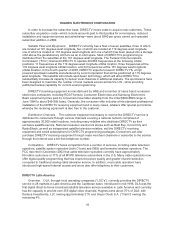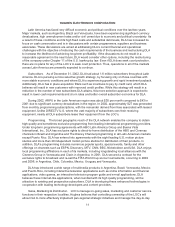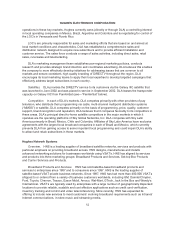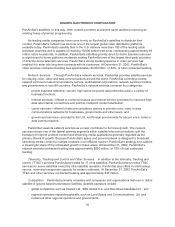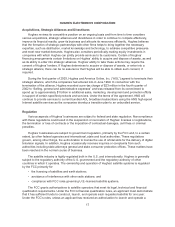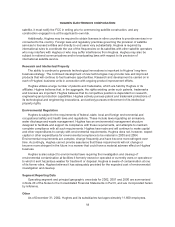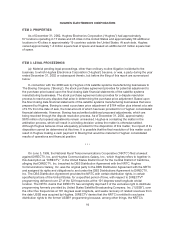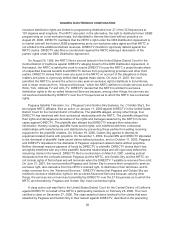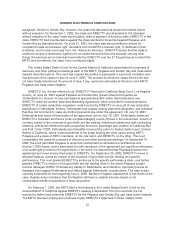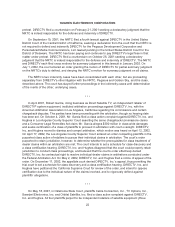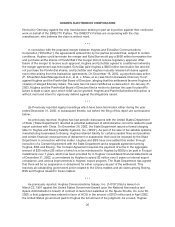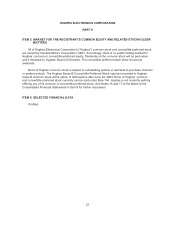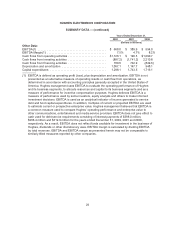DIRECTV 2002 Annual Report Download - page 30
Download and view the complete annual report
Please find page 30 of the 2002 DIRECTV annual report below. You can navigate through the pages in the report by either clicking on the pages listed below, or by using the keyword search tool below to find specific information within the annual report.HUGHES ELECTRONICS CORPORATION
exclusive distribution rights are limited to programming distributed over 27 of the 32 frequencies at
101 degrees west longitude. The NRTC also pled, in the alternative, the right to distribute former USSB
programming on a non-exclusive basis, but stipulated to dismiss this claim without prejudice on
August 25, 2000. DIRECTV maintains that the NRTC’s right under the DBS Distribution Agreement is
to market and sell the former USSB programming as its non-exclusive sales agent and that NRTC is
not entitled to the additional claimed revenues. DIRECTV intends to vigorously defend against the
NRTC claims. DIRECTV also filed a counterclaim against the NRTC seeking a declaration of the
parties’ rights under the DBS Distribution Agreement.
On August 26, 1999, the NRTC filed a second lawsuit in the United States District Court for the
Central District of California against DIRECTV alleging breach of the DBS Distribution Agreement. In
this lawsuit, the NRTC is asking the court to require DIRECTV to pay the NRTC a proportionate share
of unspecified financial benefits that DIRECTV derives from programming providers and other third
parties. DIRECTV denies that it owes any sums to the NRTC on account of the allegations in these
matters and plans to vigorously defend itself against these claims. On June 21, 2001, the court
permitted the NRTC to amend the action to also seek an exclusive right to distribute in its territories,
and to retain revenues from, “Advanced Services,” which the NRTC defines to include services such as
Wink, TiVo, Ultimate TV and AOL-TV. DIRECTV denies that the NRTC is entitled to exclusive
distribution rights to the so-called Advanced Services because, among other things, the services are
not services transmitted by DIRECTV over the 27 frequencies as to which the NRTC has contractual
rights.
Pegasus Satellite Television, Inc. (“Pegasus”) and Golden Sky Systems, Inc. (“Golden Sky”), the
two largest NRTC affiliates, filed an action on January 11, 2000 against DIRECTV in the United Sates
District Court for the Central District of California. The plaintiffs alleged, among other things, that
DIRECTV has interfered with their contractual relationship with the NRTC. The plaintiffs alleged that
their rights and damages are derivative of the rights and damages asserted by the NRTC in its two
cases against DIRECTV. The plaintiffs also alleged that DIRECTV misused their subscriber
information, thereby violating plaintiffs’ trade secret rights, and interfered with their contractual
relationships with manufacturers and distributors by preventing those parties from selling receiving
equipment to the plaintiffs’ retailers. On October 19, 2000, Golden Sky agreed to dismiss its
equipment-related claims with prejudice. On November 1, 2002, the plaintiffs and DIRECTV stipulated
to the dismissal of plaintiffs’ trade secret claims without prejudice, and on October 11, 2002, Pegasus
and DIRECTV stipulated to the dismissal of Pegasus’ equipment-related claims without prejudice.
Neither dismissal required payment of funds by DIRECTV or plaintiffs. DIRECTV denies that it has
wrongfully interfered with any of the plaintiffs’ business relationships and will vigorously defend the
remaining claims in the lawsuit. DIRECTV filed a counterclaim on March 9, 2001, seeking judicial
declarations that the contracts between Pegasus and the NRTC, and Golden Sky and the NRTC, do
not include rights of first refusal and will terminate when the DIRECTV 1 satellite is removed from orbit.
On June 21, 2001, the court permitted Pegasus and Golden Sky to amend their complaint to seek an
exclusive right, also derivative from the NRTC’s claimed right, to distribute in their territories, and to
retain revenues from, the “Advanced Services.” DIRECTV denies that Pegasus and Golden Sky are
entitled to exclusive distribution rights to the so-called Advanced Services because, among other
things, the services are not services transmitted by DIRECTV over the 27 frequencies as to which the
NRTC and derivatively, Pegasus and Golden Sky, have contractual rights.
A class action suit was filed in the United States District Court for the Central District of California
against DIRECTV on behalf of the NRTC’s participating members on February 29, 2000. The court
certified a class on December 27, 2000. The class asserted claims identical to the claims that were
asserted by Pegasus and Golden Sky in their lawsuit against DIRECTV, described in the preceding
20


